It’s just a square building made of white planks with a gray pyramid roof settled on top, like a hat that’s a little bit too big. The building could have been the inspiration for the schoolhouse in the Little House on the Prairie books. The original hardcover versions of Laura Ingalls Wilder’s series may even be housed within the wooden bones.
The little lost library in the middle of town…
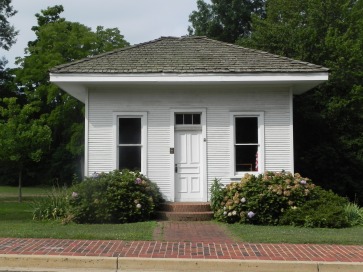 When the tiny library was built in 1897, no one probably thought of it as tiny. Back then a railroad still ran through town, well before the tracks were paved over and became a trail for bicyclists in colorful spandex. During construction, the town of Vienna, VA, was barely a mile across and horse and buggies rolled along the muddy streets. Today the town bustles with craft beer dens and music venue-coffee shops.
When the tiny library was built in 1897, no one probably thought of it as tiny. Back then a railroad still ran through town, well before the tracks were paved over and became a trail for bicyclists in colorful spandex. During construction, the town of Vienna, VA, was barely a mile across and horse and buggies rolled along the muddy streets. Today the town bustles with craft beer dens and music venue-coffee shops.
The building is now called the Original Vienna Library. Although replaced by a newer, shinier model a few blocks away in the 1960s, the original library still rests in the center of town. However, not many people notice it anymore.
Some passersby may smile at the sign out front denoting its historical pedigree or at the Little Lending Library box. But these are just superficial grins. Most residents and visitors of the town I imagine have never walked through the old white door. The Original Vienna Library is only open once a month for a few hours, after all. The stars of playdates, power walks and wine meet-ups would have to align in order to fit a visit into the complicated schedules of Vienninites.

Like the decommissioned red caboose across the street, the Original Vienna Library provides a fledgling anchor to the idea of old village charm in a town swelling with giant mansions and young families who appreciate books, but prefer them on their Kindles or as objects at their book clubs. In this changing demographic, not much thought is given to an old library museum housing only yellow-paged vintage books you can’t even technically check out.
It appeared out of nowhere but had been there all my life…
I can’t be too critical of the current Vienna residents. I grew up in this town and I never noticed the old library building either, which sits in the shadow of an old-fashioned candy store. As a kid when it was a choice between books and sugar, sugar won. Sugar > Books. It’s like basic kid math.
“Original Vienna Library?” I say to my daughter, as I spot the sign during a visit to the local town festival, Viva Vienna. “Where did it come from?”

She replies with something teenagery like, “It’s always been here. How did you miss it?” And then, like any good, dutiful daughter who knows it’s better to placate your crazy writer mom than to try to fight against the forces of her book-obsessed nature, she smiles for a picture and walks with me through the door. (Trust me, I know how lucky I am to have a kid like her.)
Some people will move heaven and earth, or at least a building, for access to books…
It’s dark inside and the one-room building smells like books. Not just books, old books, a perfume created from cloth and paper absorbing a century of history, like bricks of a fireplace lock in the smell of ash and embers. It’s the smell of the past when books were like precious gems and libraries were the intellectual souls of small towns.
The one-room building smells like books…a perfume created from cloth and paper absorbing a century of history, like bricks of a fireplace lock in the smell of ash and embers.
I run my fingers across the bumpy bindings. I love the faded colors, the frayed edges. The content of books can take me to any place and any time, but holding a book that is 20, 40, 80, 100 years old connects me to the past. Someone else, many someone elses, held this book, read this book. Who were they? What did they think of it? How fun would it be to open a book and be able to know the life of all the people who read it before?

My mother often talks about when she was a teenager, how excited she’d get for the bookmobile to come by her house. She always loved books, but they were scarce, and, therefore, precious. This place reminds me of my mother, the young version of her, the wide-eyed girl eager to slip between the pages and disappear.
A local library expert sits in a chair near the window, clicking a little sliver counter as people enter. His voice carries across the room and finds me. It’s impossible not to. There’s no place to hide in here.
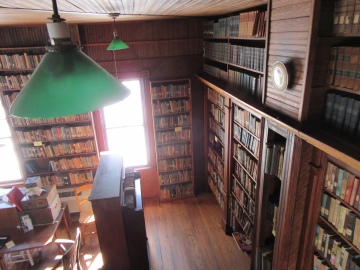 He starts by reciting the number of books currently housed in the library (somewhere in the 5,000 range). And he explains how a historian has been trying to figure out the original organization system for the library since it pre-dated the Dewey Decimal system.
He starts by reciting the number of books currently housed in the library (somewhere in the 5,000 range). And he explains how a historian has been trying to figure out the original organization system for the library since it pre-dated the Dewey Decimal system.
Then he tells me how the actual, physical building I’m standing in moved two times. The first move, he explains, was at the behest of the town. In 1912, the Vienna residents wanted the library moved closer to the center of town because its original location was just too far away.
There’s something about this fact that makes me feel awe for the past and a bit of sadness for the present. These turn-of-the-century townspeople requested an entire building be moved so they could more easily read books.
Today books can be borrowed or bought with a tap of our fingers. We go to Amazon or even a library app and with one click, we have instant access to nearly any piece of literature. Yet, as a society, we read less than ever before.
What happened? I wonder as he tells me this story. Has the kind of revere for books that would cause an entire town to move a building been left in the past, buried under binge-watching, non-stop news cycles and social media? Does unfettered access always come with the downside of diminished appreciation?
It’s not a library unless it has histories and mysteries…
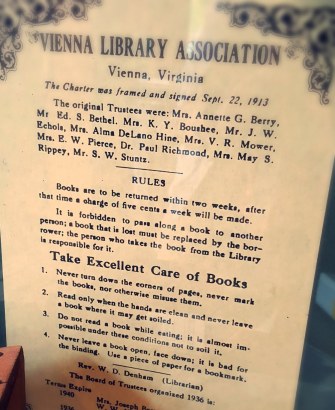 As I walk the creaking floors, I spin further into the past when I spot the yellow-spines of the Nancy Drew and Hardy Boys mysteries. My grandmother had books from these series tucked away in her basement. I’d tiptoe down the stairs, pretending to be an explorer discovering an ancient piece of literature in an old abandoned house. I’d crack open the books carefully. The binding would bend beneath my fingers. As I flipped the delicate pages, I’d whisper, “In this version of Nancy Drew, there’s a secret code for finding a treasure inside this house” or “If I read this old book backward it will unleash a ghost.” The old books became part of my imagination and when I was done, I’d carefully return them to the shelf, unharmed. They felt sacred.
As I walk the creaking floors, I spin further into the past when I spot the yellow-spines of the Nancy Drew and Hardy Boys mysteries. My grandmother had books from these series tucked away in her basement. I’d tiptoe down the stairs, pretending to be an explorer discovering an ancient piece of literature in an old abandoned house. I’d crack open the books carefully. The binding would bend beneath my fingers. As I flipped the delicate pages, I’d whisper, “In this version of Nancy Drew, there’s a secret code for finding a treasure inside this house” or “If I read this old book backward it will unleash a ghost.” The old books became part of my imagination and when I was done, I’d carefully return them to the shelf, unharmed. They felt sacred.
The old books became part of my imagination and when I was done, I’d carefully return them to the shelf, unharmed. They felt sacred.
“Do you know why Nancy Drew and the Hardy Boys are always together?” the library guru nestled by the window asks two women who have wandered through the door. In the small room, I can’t help but overhear the conversation.
“No,” they reply.
“Carolyn Keene wrote the Nancy Drew books and Franklin Dixon wrote Hardy Boys. But they’re actually the same person. I can’t remember his name, but it was a common thing to do back then,” he explains.
(I, of course, had to look this up when I got home and found out he was partially correct. These classic series were written under pen names. But it wasn’t one person who wrote them all, it was a ghost-writing conglomerate of people known as the Stratemeyer Syndicate. And even that is an oversimplification of the mystery surrounding the authors of these famous books. A story for another time…)
Are secrets of the library’s magic lost forever?
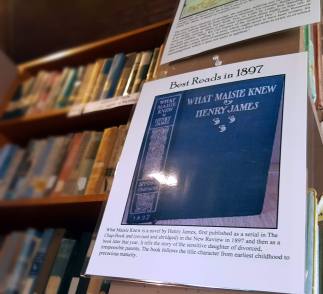 The Original Vienna Library and the people who take care of it keep these kinds of literary secrets and treasures locked up in the ancient walls. Secrets just waiting to be discovered if you walk in and hold a book or just listen for a few minutes. Yet this once central building has become a ghost. There, but mostly forgotten, like an old rocking chair in the basement. A literary soul hidden under cobwebs. But at least once a month for 3 hours, it can be found again and people like me can appreciate its magic.
The Original Vienna Library and the people who take care of it keep these kinds of literary secrets and treasures locked up in the ancient walls. Secrets just waiting to be discovered if you walk in and hold a book or just listen for a few minutes. Yet this once central building has become a ghost. There, but mostly forgotten, like an old rocking chair in the basement. A literary soul hidden under cobwebs. But at least once a month for 3 hours, it can be found again and people like me can appreciate its magic.
What do you think? Have our literary souls been buried under technology and social media or just transformed into something new in the modern age? Can we ever get back that revere people had for books when they were scarce, like precious gems, or is that gone forever?
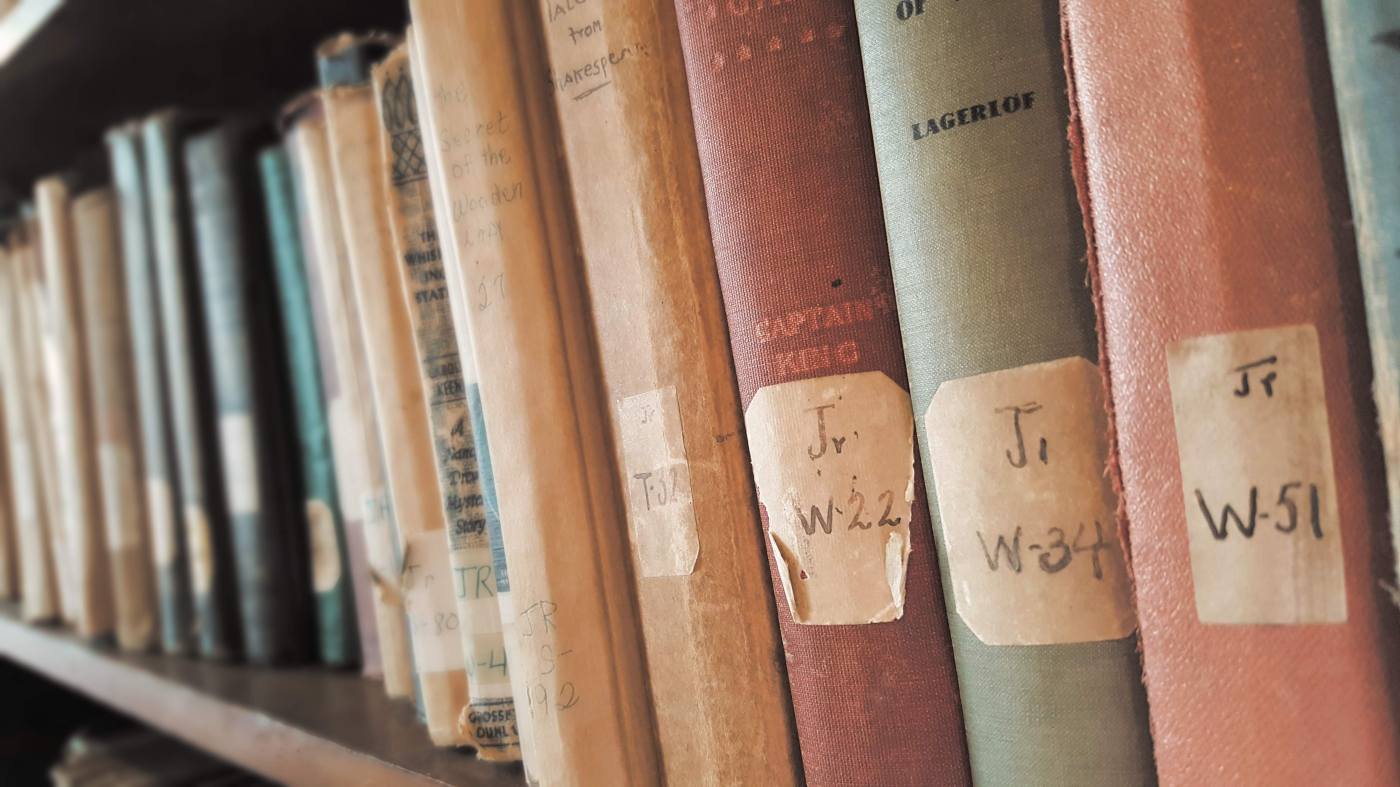










May 29, 2018 at 12:35 pm
I think there are some places and people that hold libraries in reverence. In my home city, for example, when the city council considered closing two of our smallest library branches, there was such an outcry that they changed their minds and kept them open.
Certainly libraries aren’t the hushed places they once were, but it never bothers me to go into my favorite library branch and hear people chatting or kids laughing after storytime. It just tells me that our library is still relevant, but different from what it was a century ago.
LikeLiked by 1 person
May 29, 2018 at 12:47 pm
I love that your town fought for its libraries! That is so incredible. Those stories are so fantastic. Makes me feel good about books and life and the world to hear things like that. And, yes, libraries, at least around me, do seem to be trying to become less stuffy and more relevant social centers/change w/ the times. My favorite thing one of our local libraries does is they have puppy reading time where they bring in service dogs and kids can sit there and read while the dogs snuggle with them. It’s the cutest thing I’ve ever seen!!
LikeLiked by 1 person
May 29, 2018 at 1:37 pm
Ours does the puppy storytime, too! It’s so cute! And they host book clubs and meetups and trivia nights now and then. I wish my work hours were different so I could attend some of these events. They sound like they would be fun!
As for my community, it’s a pretty book-friendly place. The only reason one indie bookstorw closed a while back was because the owners decided to retire. There was much sadness when they closed their doors.
LikeLiked by 1 person
May 29, 2018 at 2:30 pm
It sounds like you have a great town! I love indie bookstores. I’d love to open one someday….a girl can dream. 🙂
LikeLiked by 1 person
May 29, 2018 at 6:11 pm
This is adorable!
LikeLiked by 1 person
May 29, 2018 at 7:46 pm
Aw. Thanks!!
LikeLike
May 29, 2018 at 10:05 pm
Very cool post – I’ve lived in the DC area on and off but I’ve never visited. I’ll drop in next time I’m in town. The picture of the stacks is wonderful – something I’d like to build into my retirement home. 😀😀
LikeLiked by 1 person
May 29, 2018 at 11:06 pm
It’s a cute little library and Vienna is a cute town. Plus they have a new indie bookstore, it’s great…so if you’re ever in the DC area again, lots of bookish things to do there!
LikeLiked by 1 person
May 30, 2018 at 10:46 am
I’ve always loved Vienna – it’s a calm alternative to downtown DC and Old Town. Agree that DC is a great reader’s city. Can’t tell you how many hours I’ve spent at Kramerbooks & Afterwords cafe on DuPont Circle. I get back fairly often to visit family and I’ll try to check out the Vienna Library. Have a great week. Brian
LikeLiked by 1 person
June 8, 2018 at 2:31 pm
This looks like such a cute place!!
LikeLiked by 1 person
June 9, 2018 at 2:56 pm
So adorable. I want to live there. They probably wouldn’t be OK with that…maybe I could volunteer. ;0
LikeLiked by 1 person